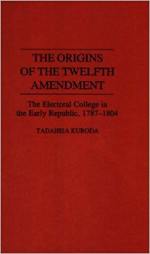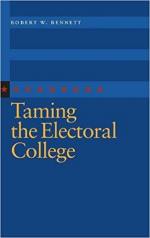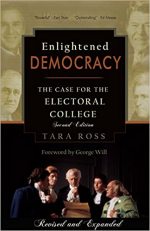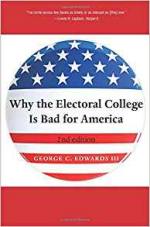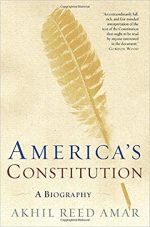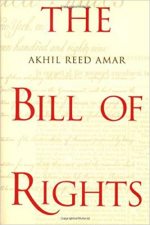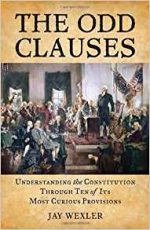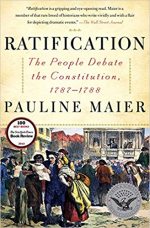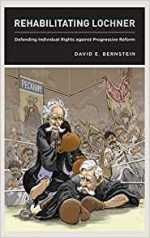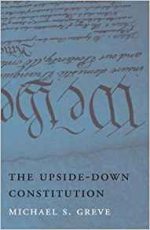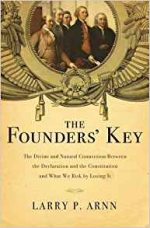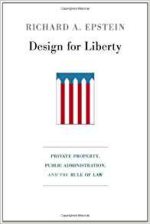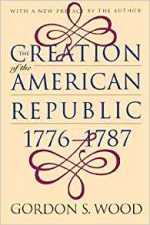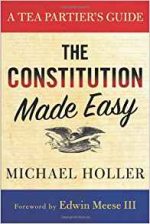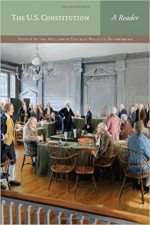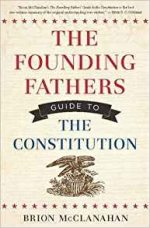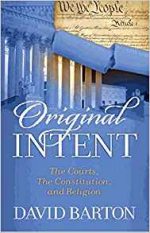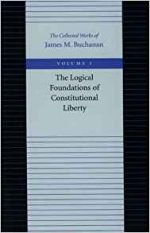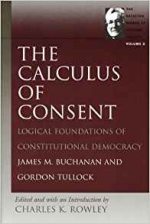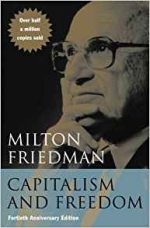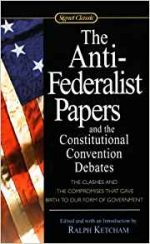The Constitution of the United States: Amendment 12 (12th Amendment)
Amendment XII. (Election of President and Vice-President)
Passed by Congress December 9, 1803. Ratified June 15, 1804.
Note: A portion of Article II, section 1 of the Constitution was superseded by the 12th amendment.
The Electors shall meet in their respective states and vote by ballot for President and Vice-President, one of whom, at least, shall not be an inhabitant of the same state with themselves; they shall name in their ballots the person voted for as President, and in distinct ballots the person voted for as Vice-President, and they shall make distinct lists of all persons voted for as President, and of all persons voted for as Vice-President, and of the number of votes for each, which lists they shall sign and certify, and transmit sealed to the seat of the government of the United States, directed to the President of the Senate; — the President of the Senate shall, in the presence of the Senate and House of Representatives, open all the certificates and the votes shall then be counted; — The person having the greatest number of votes for President, shall be the President, if such number be a majority of the whole number of Electors appointed; and if no person have such majority, then from the persons having the highest numbers not exceeding three on the list of those voted for as President, the House of Representatives shall choose immediately, by ballot, the President. But in choosing the President, the votes shall be taken by states, the representation from each state having one vote; a quorum for this purpose shall consist of a member or members from two-thirds of the states, and a majority of all the states shall be necessary to a choice. [And if the House of Representatives shall not choose a President whenever the right of choice shall devolve upon them, before the fourth day of March next following, then the Vice-President shall act as President, as in case of the death or other constitutional disability of the President. –]* The person having the greatest number of votes as Vice-President, shall be the Vice-President, if such number be a majority of the whole number of Electors appointed, and if no person have a majority, then from the two highest numbers on the list, the Senate shall choose the Vice-President; a quorum for the purpose shall consist of two-thirds of the whole number of Senators, and a majority of the whole number shall be necessary to a choice. But no person constitutionally ineligible to the office of President shall be eligible to that of Vice-President of the United States.
* Superseded by section 3 of the 20th amendment.
Ask History: Ask History: Electoral College | History
More
- The Constitution of the United States: Amendments 11-27, from The National Archives
- Twelfth Amendment – CRS Annotated Constitution
- Twelfth Amendment – Wikipedia
- Twelfth Amendment – Findlaw
- The Constitution of the United States: A Transcription – The National Archives
- United States Constitution: Texts, Commentaries, Historical Texts and Judicial Decisions – Law Library of Congress
- The Constitution of the United States of America: Analysis and Interpretation – FDsys
- Constitution of the United States of America: Analysis and Interpretation, Govinfo.gov
The 12th Amendment Explained: American Government Review
- “Federalism and the Constitution: Limits on Congressional Power,” CRS Report RL30315 (31-page PDF
 )
) - Vice President
- Electoral College
- Presidential Succession (CongressionalGlossary.com)
- Election Capitol Hill Workshop
- Mid-Term Election
- “Presidential Nominating Process: Current Issues,” CRS Report RL34222 (19-page PDF
 )
) - “Election of the President and Vice President by Congress: Contingent Election,” CRS Report RS20300 (8-page PDF
 )
) - “Contemporary Developments in Presidential Elections,” CRS Report R42139 (60-page PDF
 )
) - Meta-EE and the Constitution Part 9: Twelfth Amendment
- “Contingent Election of the President and Vice President by Congress: Perspectives and Contemporary Analysis,” CRS Report R40504 (24-page PDF
 )
) - “The Electoral College: How It Works in Contemporary Presidential Elections,” CRS Report RL32611 (34-page PDF
 )
) - “Supreme Court Clarifies Rules for Electoral College: States May Restrict Faithless Electors,” CRS Legal Sidebar LSB10515 (6-page PDF
 )
) - Electoral College – Heritage Guide to the Constitution
Electoral college | American civics | US History | Khan Academy

A free download of our Pocket Constitution is available on Scribd.
Our Pocket Constitution: details on our web site.
Do You Understand the Electoral College?
|
The Origins of the Twelfth Amendment: The Electoral College in the Early Republic, 1787-1804 |
Taming the Electoral College |
Enlightened Democracy: The Case for the Electoral College |
Why the Electoral College Is Bad for America |
|
America’s Unwritten Constitution: The Precedents and Principles We Live By |
America’s Constitution: A Biography |
What America Was Really Like In 1776 |
The Bill of Rights: Creation and Reconstruction |
|
The Odd Clauses: Understanding the Constitution Through Ten of Its Most Curious Provisions |
Living Originalism |
Ratification: The People Debate the Constitution, 1787-1788 |
Rehabilitating Lochner: Defending Individual Rights against Progressive Reform |
|
The Upside-Down Constitution |
The Founders’ Key: The Divine and Natural Connection Between the Declaration and the Constitution and What We Risk by Losing It |
Design for Liberty: Private Property, Public Administration, and the Rule of Law |
The Ideological Origins of the American Revolution |
|
The Radicalism of the American Revolution |
The Creation of the American Republic, 1776-1787 |
The Essential Federalist and Anti-Federalist Papers |
The Constitution Made Easy: A Tea Partier’s Guide |
|
The U.S. Constitution: A Reader |
The Founding Fathers Guide to the Constitution |
Original Intent: The Courts, the Constitution, & Religion |
Logical Foundations of Constitutional Liberty |
|
The Calculus of Consent |
Capitalism and Freedom |
The Road to Serfdom |
The Anti-Federalist Papers And The Constitutional Convention Debates |
For more than 40 years, TheCapitol.Net and its predecessor, Congressional Quarterly Executive Conferences, have been teaching professionals from government, military, business, and NGOs about the dynamics and operations of the legislative and executive branches and how to work with them.
Our custom on-site and online training, publications, and audio courses include congressional operations, legislative and budget process, communication and advocacy, media and public relations, testifying before Congress, research skills, legislative drafting, critical thinking and writing, and more.
TheCapitol.Net is on the GSA Schedule, MAS, for custom on-site and online training. GSA Contract GS02F0192X
TheCapitol.Net is now owned by the Sunwater Institute.
Teaching how Washington and Congress work ™

